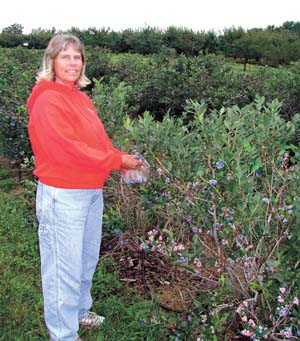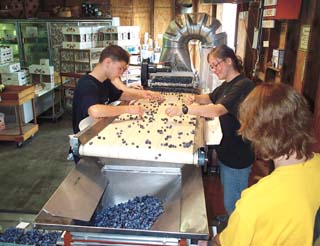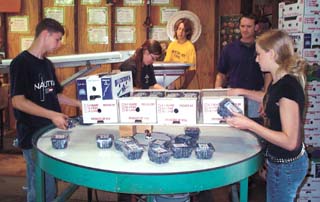
from bush to box to table Blue is in this year - especially in berries. "There has been an absolute interest in blueberries for about the past three years," Craig Michaloski, owner of Green Acre Farms on Latta Road said. "We've seen a surge in people's interest in blueberries because of their health benefits." A healthy treat The little round, deep hued berries pack a significant health punch. Blueberries, because of their antioxidant properties, are believed to counter the damaging effects of free radicals - the compounds that contribute to aging. A recent health report (and studies in white lab rats which have a similar brain make-up as humans) also showed that eating certain berries and vegetables might reduce the chance of experiencing age-related memory problems later in life. All fruits have antioxidants, chemicals that help our bodies eliminate free radicals and other harmful molecules. Blueberries, however, have the most. In fact, according to the U.S.D.A., blueberries have 40 percent more than the next best, the strawberry. The antioxidants fight heart disease and cancer and are primarily located in the blue pigment in the berry. Mark Russell from Whittier Fruit Farm and Eric Brown from Brown's Berry Patch agree that blueberries have been flying off the shelves and off the bushes since their health benefits have been made so well known. "The berry has gotten very favorable press," Russell said. "It's the dark pigment in the skin that gives it such healthy antioxidant qualities and that isn't something you can copy in a lot of other fruits." How does your garden grow? "Blueberries are very site specific as to where they will grow," Russell said. "They need a soil with a certain Ph level and they need to be well drained." Attempting to alter a soil's Ph level, Russell said, is difficult, so it is better to find land suited to the berry and plant the bushes there. Green Acre's Michaloski said that in 1991 they had a section of hilltop on the farm where nothing would grow. They tested the soil and found it to be very acidic - a perfect spot for blueberries. "We have three acres of them up on the hilltop now," he said. "Blueberries like an ample supply of water but they don't want to be sitting in water all day, so their location is perfect - they get the water but it runs off down the hill." Russell said the hairless roots of the blueberry is quite rare in a plant and it also makes it more difficult for it to drink water. "They need a lot of rain," he said. "The rain this year has been perfect for them. Russell said Whittier's 10-acre plot of blueberries is actually located in Niagara County in close proximity to Lake Ontario. "The berries were planted by Gerber, who had a large complex of farms out there and when they closed down they sold the land and that's how we got into the blueberry market," he said. They have had the fields for 15 years. Every night a crew of pickers goes to the Niagara County site, picks the berries and brings them back to Whittier Farm on Whittier Road in Ogden, where they are packed and sold in farm markets and grocery stores across the area. Brown's has grown and cultivated their high-bush berry crop for more than 20 years, Brown said. Blueberries enjoy about a nine-week long growing season which starts mid-July and winds down at the end of August. All three area farms feature high-bush variety blueberries which take about 11-15 years to reach maturity, Michaloski said. A healthy blueberry yield is about three to four tons of berries per acre, Russell said, and on his Niagara County plot they have about 1,000 bushes per acre. The bushes grow anywhere from three to six feet in height and produce for 50 years. Rain, rain go away While this year's rain has had a negative effect on many crops such as wheat and peaches, the rainfall has been adequate for the moisture-loving blueberry, all three men agree. "We haven't had to irrigate yet this season," Michaloski said. "And the size of the berries is just incredible this year." Brown agreed that the rain has been adequate but said the berries could use some more warm weather to help them mature. "There's been enough heat for them to ripen but we could use some days that are consistently above 70 degrees," he said. Birds love them, too Whether birds have heard about the health benefits of blueberries isn't known, but regardless of that knowledge, they enjoy the fruit. "The birds just come in and eat the berries," Russell said. "I don't think it is species specific but we have seen a lot of starlings and in other years seagulls seem to be the culprits." For a homeowner with a few blueberry bushes, Russell said, a bird could make short work of the fruit. As for the farmers, they work on a decoy system to keep the birds at bay. Both Whittier Farm and Green Acre utilize bird distress signals and plastic owls as deterrents. "We also use netting to keep the birds away from the bushes," Michaloski said. They have also tried using corrugated tin hawks which are suspended from a string - they make noise and the shadows cast by them act as a deterrent. Streamers that snap in the wind have also been effective ... for a short time. "The birds eventually learn it's just a deterrent and are no longer scared away so we have to change our responses to them," Russell said. At Brown's Berry Patch, Eric Brown said they found the cost and effectiveness of the deterrents to not be worth the effort. "It just doesn't seem to warrant the nuisance of putting them up." U-pick or we pick For those individuals who want to be closer to the earth and have their say in which fruits make it into their homes, some growers offer U-pick options in addition to the pre-packaged berries found in their markets. "What you need to look for in berries is a uniform, dark color and make certain they are dry," Russell said. Michaloski said that "picking" is not the right term for getting berries off the bush and into the hand. You have to flick them off the bush," he said. "If they're ripe they will fall off the bushes when you flick them." As far as pricing goes, Russell said he has found retail prices remarkably stable. "There are the usual sale prices but the non-sale price has been stable," he said. If you go
|


